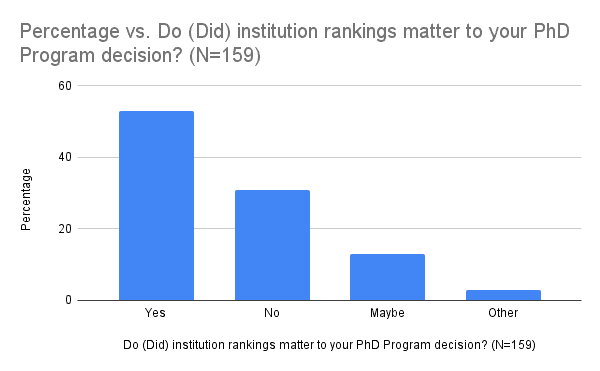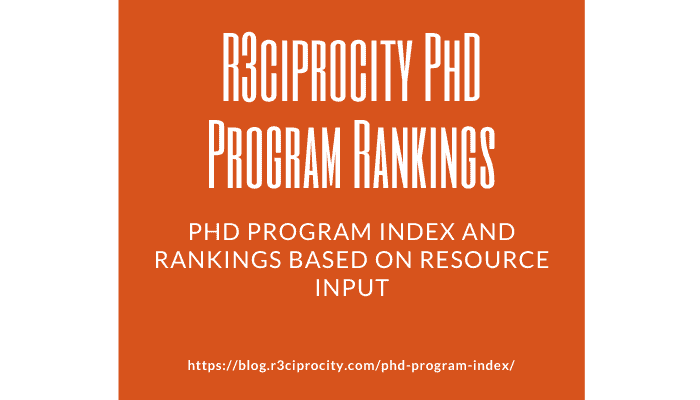Why Should You Contribute To The PhD Program Rankings?
Why should you help by disclosing information about your university? By participating in R3ciprocity PhD Program Rankings, you are helping out others make decisions about their education that is based on data.
Please enter information that is close to as factual as possible. If you add spam and the like, I will just delete it from the list.
Please enter your university and college / school, and answer the following questions. Please also provide your discipline. For example, if you are in Finance, indicate “Finance.” If you are in theoretical physics, indicate “Theoretical Physics.” Be sure to also distinguish what type of program you are in.
If you have information about multiple programs or universities, I encourage you to enter this information. It will benefit many others in the future.
We will not collect your email address or identifying information.
This is to be only used for fun and learning, and to help you make wiser graduate program decisions. This will not be used for research, unless we explicitly ask your permission.
Why Do We Have The R3ciprocity Top PhD Program Rankings?
We currently have a problem in assessing PhD Programs. Most PhD program rankings are based on outputs. Common rankings are based on the number of publications per graduate program, and institutional placement of PhD candidates. Here are some available PhD program rankings that I could find.
- American Economic Association page on Economics Program rankings.
- UT Dallas Research Rankings of Business Schools.
- Forbes Rankings Of Business Schools.
- US World & News Rankings of American Institutions
- FT Times Rankings of MBA Programs
- National Research Council of Rankings Of Psychology Programs.
There are three big programs with most of these rankings of graduate schools. First, most of the available rankings focus on either undergraduate education or graduate education at the Master’s level. This could be problematic. For example, generalizing from a MBA Program rankings to PhD Program rankings, while could be a representative inference, but it is likely not accurate. Different institutions are likely to prioritize different programs in different ways.
Second, most PhD Program rankings are at the national level. It makes it extremely difficult to compare across countries. We also know that science is largely an international affair, and thus, these national rankings can exclude programs that may be of interest to students globally.
Third, since most rankings of PhD Programs are based on outputs (number of articles being published), they have selection biases and do not account for the differences of ‘quality’ in resources going into the program. These measures only capture what happens to the best students because they are the ones that are most likely to get publications or are likely to place at other academic institutions. If you do not ‘place’ at an institution once you are done your PhD Program, it is difficult to capture your associated rank.
Moreover, PhD rankings somewhat confound the effects of the institution with the effects of the student. By looking at the outcomes of the students only, it is impossible to know if the institution had an effect or the students that were just exceptionally good (or bad) before they went to that institution. In other words, those students would have done well (or poorly) independent of the institution. This is a problem of any ranking of outputs, and is well-known problem in identifying the effects education. To reduce selection biases, the R3ciprocity PhD Program Rankings focuses on the inputs into the each PhD Program.
A PhD Program Rankings that focuses on inputs provides better picture into what resources are available to incoming doctoral students, so then they can choose the program that best provides the resources that helps them succeed. We want to know what are the resources available to the PhD student. Input resources are going to give a better indication of the effects of each institution.
Do PhD Rankings Matter To PhDs?
PhDs do look at rankings when they choose their PhD Programs. I did a series of polls on the R3ciprocity YouTube community, which is primarily PhDs and researchers, I found strong evidence that PhDs rely on rankings. Out of 159 PhDs and potential PhDs, 53% rely (relied) on institutional rankings to make decisions about their PhD Program. Only 31% said that institution rankings did not matter to their PhD Program choice. In another poll, I asked “Do PhD Program rankings inform your decision to become a PhD?” Of the 94 people that answered, 41% indicated that they did use PhD rankings to inform their decision to become a PhD. Rankings are important.

Here is the interesting thing: Most PhDs and professors do not think that current rankings fairly represent their PhD Programs. In a poll on R3ciprocity community in September, 2021, ~70% of the PhDs and Professors (n=69) do not think that current institutional rankings represent their programs very well.
In another Poll in September 2021, I asked the following question “As A PhD / Professor, do you think your current institution is fairly represented with the ranking system it uses for its Doctoral Program?” 62% of the respondents (n=69) indicated that (“No”) the current rankings that their Doctoral Program uses to identify its standing is not representing its PhD Program very well.
I want to change this – can we make a rankings for PhD Programs that is not only specific for Doctoral Programs, but can it also focus on the inputs to PhD Programs?

I also asked if “Would PhD Programs rankings help you make a better choice for a PhD Program?” Of the 66 people that answered on the R3ciprocity YouTube community, 56% responded that “yes” PhD Programs rankings help you make a better choice for a PhD Program. Let’s try to help people make wise choices, and help motivate university decision-makers to improve their PhD Programs with the following “input-based” PhD Program ranking.
How was the PhD Program Rankings created?
This form is a crowdsourced effort from the R3ciprocity Project to rank PhD Programs based on input resources.
The PhD Program Rankings was crowdsourced using the R3ciprocity YouTube community. Based on 251 responses in the winter of 2020, we derived items for this poll. The community is mostly PhD students, researchers, and professors.
University Administration & Staff
For PhD Program Administration at your respective universities, please verify this information annually. To verify this information, please make a donation to the R3ciprocity Project. Contact me: contact_at_r3ciprocity_dot_com.
Why do I ask for you to provide a donation? This is to ensure that you are administrative staff, and to encourage your institution to participate in the R3ciprocity Project. When you verify this information, I will put an indicator that this has been verified by university administration, allow you to put a link on the list, and include a column for information you wish to provide.
The goal is to help researchers become better researchers. One way is to help provide transparent and factual information about the nature of research and science. By donating to the R3ciprocity Project, you will be furthering the development of tools that help researchers and graduate students do better.
The funds will be used to build the R3ciprocity Project, but also to eventually create scholarships for doctoral students and researchers.

